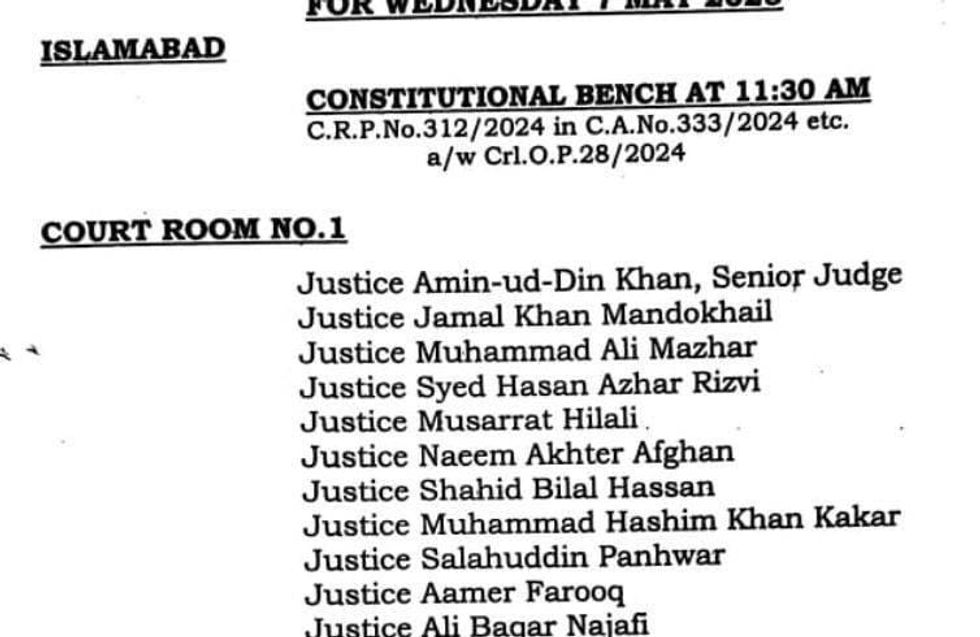Pakistan's top court drops dissenting judges from review of ruling favoring Khan’s party
Justice Ayesha Malik and Justice Aqeel Abbasi dissented, terming the review petitions inadmissible

Aamir Abbasi
Editor, Islamabad
Aamir; a journalist with 15 years of experience, working in Newspaper, TV and Digital Media. Worked in Field, covered Big Legal Constitutional and Political Events in Pakistan since 2009 with Pakistan’s Top Media Organizations. Graduate of Quaid I Azam University Islamabad.

File Photo: The Supreme Court of Pakistan.
SCP
Original 8-5 court verdict overturned Election Commission's denial of seats to Khan's allies
Election Commission admitted implementing only 'one paragraph' of previous ruling
The two dissenting judges who opposed hearing challenges to a controversial ruling on parliamentary seats have been removed from Pakistan's Supreme Court bench.
Justice Ayesha Malik and Justice Aqeel Abbasi, who termed the petitions inadmissible, are not included in the list of judges who will hear the case Wednesday, according to the cause list issued by the registrar's office of the Supreme Court of Pakistan.
Pakistan's Supreme Court agreed Tuesday to hear challenges to its earlier ruling that granted parliamentary seats reserved for minorities and women to the party of imprisoned former Prime Minister Imran Khan.
The court issued notices to all parties involved in the case, which centers on the allocation of 77 reserved seats—originally denied to PTI due to a symbol ban that was interpreted by the Election Commission of Pakistan (ECP) to mean its candidates would be forced to contest the February 2024 elections as independents.
Over 80 of these independent candidates joined the Sunni Ittehad Council (SIC) after the elections, which then claimed a share of reserved seats. The ECP rejected the request, citing procedural non-compliance, including SIC's failure to submit a pre-election list of candidates as required by law.
The Supreme Court, in an 8–5 verdict on July 12, 2024, overturned that decision, awarding the seats to PTI—essentially restoring the party's legislative strength by proxy. That judgment was met with fierce backlash from rival parties and legal experts, who accused the judiciary of exceeding its mandate and changing electoral outcomes.
However, other legal experts and the PTI defended the ruling, arguing it protected voters' constitutional rights by correcting the ECP's partisan actions.
Bench changed after dissent?
A 13-member full bench, headed by Justice Amin-ud-Din Khan, heard the case and adjourned proceedings until Wednesday.
The decision to admit the petitions was made by a majority of 11 judges, while two members of the bench — Justice Ayesha Malik and Justice Aqeel Abbasi — dissented, terming the petitions inadmissible.

According to the cause list issued by the registrar's office of the Supreme Court of Pakistan and uploaded on its website, Justice Ayesha Malik and Justice Aqeel Abbasi, who had dissented in the hearing, are not included in the list of judges who will hear the case tomorrow.
Legal arguments presented
On Tuesday, ruling party Pakistan Muslim League-Nawaz's (PML-N) counsel Barrister Haris Azmat argued before the bench that reserved seats were unconstitutionally awarded to a party that neither contested the elections independently nor submitted candidate lists.
"How can a party benefit from reserved seats without fulfilling basic legal obligations?" he asked, pointing out that SIC never formally merged with PTI, nor did PTI petition for those seats.
Judicial debate and ECP compliance
Prior to her removal, Justice Ayesha Malik questioned the very basis of the review, noting that the original verdict had addressed these concerns in detail. "You're essentially re-arguing your original case," she told Barrister Azmat.
Justice Aqeel Abbasi, also now removed, similarly challenged the maintainability of the petitions, emphasizing that review jurisdiction under Article 188 of the constitution is narrow and cannot serve as a re-trial.
The court also confirmed that a contempt of court petition related to non-implementation of the original verdict will be heard alongside the case.
Justice Hashim Kakar questioned ECP counsel Sikandar Bashir Mohmand directly, asking whether the commission had fully implemented the ruling. "We have acted on only one paragraph," the ECP lawyer admitted, prompting sharp criticism from the bench.
Justice Jamal Mandokhail warned against selective compliance. "You can't cherry-pick which parts of a Supreme Court decision to follow. If we order a hanging, can a convict claim compliance by merely placing the noose around their neck?"







Comments
See what people are discussing